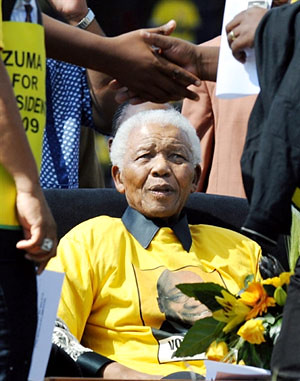
Former African National Congress and Republic of South Africa President Nelson Mandela campaigns at the 100,000-strong rally held at Ellis Stadium in Johannesburg for the ANC on April 19, 2009., a photo by Pan-African News Wire File Photos on Flickr.
Mandela ‘breathed life into SA economy’
December 10, 2013
Johannesburg. — Nelson Mandela brought not only the gift of political freedom to South Africans, but also a huge gift to South Africa’s business community. While South Africans and the rest of the world were caught up in the euphoria of witnessing Mandela’s first steps of freedom, the stark reality was that he inherited a country in deep economic trouble.
Reserve Bank figures show the country, as the world’s leading gold producer at the time, had depleted official gold and foreign exchange reserves with substantial foreign liabilities by the time the apartheid regime ended.
The successful global disinvestment campaign during the 1980s dealt a severe blow to the apartheid regime.
During United Nations hearings in Geneva in September 1989, the International Chamber of Commerce reported that more than 550 firms had disinvested from South Africa since 1985.
Besides this huge capital flight, South Africa’s internal economy was in shambles, with high inflation, huge military spending to quell internal unrest and continued fighting in frontline states, coupled with slow consumer spending leading to an overall annual growth rate that slipped to less than 1 percent.
Despite being branded a communist by the apartheid propaganda machine, Mandela showed a profound understanding of the importance of foreign direct investment, even before he was sworn in as South Africa’s first democratically elected president.
Shortly after his release, Mandela undertook a successful world tour. His main aim was to rally business, both locally and globally, to support the rebuilding of the country he was to lead.
He did this to lift millions of people out of extreme poverty and to save the country’s economic system from spiralling out of control.
His acute understanding of this requirement, which, if left unsatisfied, would scuttle the efforts of a newly elected government, is evident in his pleas to overseas governments and his understanding that South Africa depended on foreign capital and technology for its growth.
In his historic first address to the UN on September 24, 1993, Mandela not only asked for an end to the huge sanctions effort that helped to bring apartheid to an abrupt end, he used the opportunity in the global spotlight to call for investment.
“We hope that both the South African and the international investor communities will also take this opportunity themselves to help regenerate the South African economy, to their mutual benefit.”
The very next day, the International Monetary Fund responded with a pledge of US$850 million in economic aid.
But, under the great leadership of former president Mandela, how successful was the new South Africa in attracting foreign capital back to the golden shores of a black majority-ruled country?
The then governor of the Reserve Bank, Chris Stals, was astounded: “Over the 18 months from July 1994 to December 1995, a net amount of more than R30 billion flowed into the country from the rest of the world.
This exceeded even the most optimistic expectations at the time of the election of the government of national unity in April 1994.”
The activity on the JSE confirmed this. In 1992, the total value of shares traded amounted to R22 billion, but then increased to R63 billion in 1995.
The increase in the turnover in the bond market was even more spectacular, having risen from R496 billion in 1992 to R2,006 billion in 1995.
Capital outflows of R15 billion suddenly switched to net inflows of nearly R30 billion as from April 1994.
This led to a growth rate of 3,5 percent in 1995, “the best South Africa experienced since 1988”, said Stals.
Hundreds of global companies returned to South Africa, bringing billions in investment — with total investment of R12 billion in the first half of 1997 alone. Instrumental to the return of these billions of dollars in foreign direct investment, financial flows, increases in foreign reserves — to say nothing of the latest technology and international trade — was Mandela.
Through his consistent and impassioned plea for the international community to “produce that magical elixir” of the marketplace, and “by achieving success not only in politics but also in the social-economic sphere”, Mandela ensured the hype around South Africa’s transition to democracy and his personal sacrifice, as the leader embodying the collective sacrifice of thousands of black South Africans, was honoured in material terms by his hard-hitting invitation to the international business community to invest in this country for the benefit of all.
— Businessday.
No comments:
Post a Comment